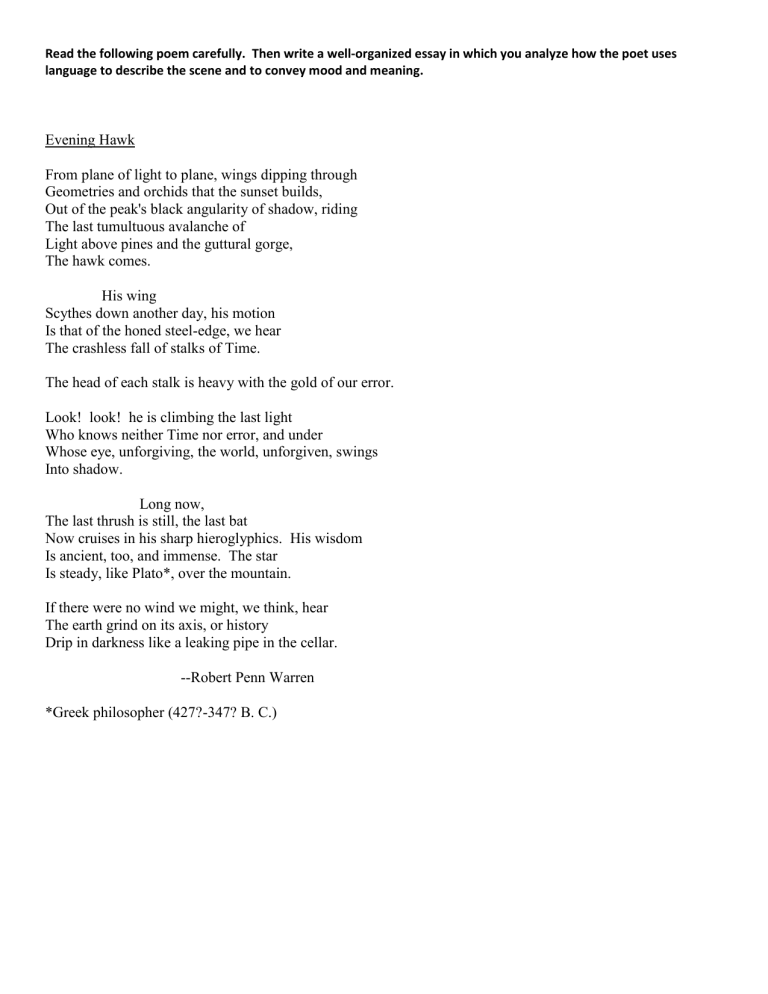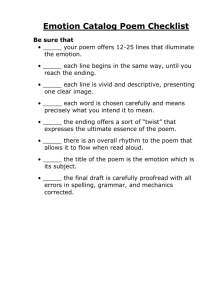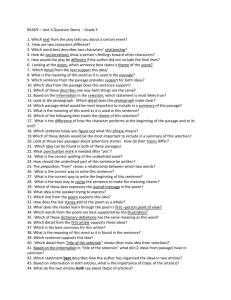Evening Hawk Prompt

Read the following poem carefully. Then write a well-organized essay in which you analyze how the poet uses language to describe the scene and to convey mood and meaning.
Evening Hawk
From plane of light to plane, wings dipping through
Geometries and orchids that the sunset builds,
Out of the peak's black angularity of shadow, riding
The last tumultuous avalanche of
Light above pines and the guttural gorge,
The hawk comes.
His wing
Scythes down another day, his motion
Is that of the honed steel-edge, we hear
The crashless fall of stalks of Time.
The head of each stalk is heavy with the gold of our error.
Look! look! he is climbing the last light
Who knows neither Time nor error, and under
Whose eye, unforgiving, the world, unforgiven, swings
Into shadow.
Long now,
The last thrush is still, the last bat
Now cruises in his sharp hieroglyphics. His wisdom
Is ancient, too, and immense. The star
Is steady, like Plato*, over the mountain.
If there were no wind we might, we think, hear
The earth grind on its axis, or history
Drip in darkness like a leaking pipe in the cellar.
--Robert Penn Warren
*Greek philosopher (427?-347? B. C.)
AP RUBRIC FOR "Evening Hawk"
2006 AP ENGLISH LITERATURE SCORING GUIDELINE
Question #1: Robert Penn Warren’s “Evening Hawk”
General Directions: This scoring guide will be useful for most of the essays that you read, but in problematic cases, please consult your table leader. The score that you assign should reflect your judgment of the quality of the essay as a whole—its content, its style, its mechanics. Reward the writers for what they do well. The score for an exceptionally well-written essay may be raised by one point above the otherwise appropriate score.
In no case may a poorly written essay be scored higher than a three (3).
9-8 These essays offer a persuasive analysis of the language the poet uses to describe the scene and to convey mood and m eaning. Although the writers of these essays offer a range of interpretations and choose to emphasize different poetic techniques, these papers provide convincing readings of the poem and demonstrate consistent and effective control over the elements of composition in language appropriate to the analysis of poetry. Their textual references are apt and specific. Though they may not be error-free, these essays are perceptive in their analysis and demonstrate writing that is clear and sophisticated, and in the case of a nine (9) essay, especially persuasive.
7-6 These competent essays offer a reasonable analysis of the language the poet uses to describe the scene and to convey mood and meaning. They are less thorough or less precise in their discussion of the themes and techniques, and their analysis of the relationship between the language and the themes is less convincing.
These essays demonstrate the writer’s ability to express ideas clearly with references to the text, although they do not exhibit the same level of effective writing as the 9-8 papers. While essays scored 7-6 are generally well written, those scored a seven (7) demonstrate more sophistication in both substance and style.
5 These essays may respond to the assigned task with a plausible reading of the poem, but they may be superficial in analysis of theme and technique. They often rely on paraphrase, but paraphrase that contains some analysis, implicit explicit. Their analysis of the language of the poem may be vague, formulaic, or inadequately supported by eferences to the text. There may be minor misinterpretations. These writers demonstrate control of language, but the writing may be marred by surface errors. These essays are not well conceived, organized, or developed as 7-6 essays.
4-3 These lower-half essays fail to offer an adequate analysis of the language of the poem. The analysis may be partial, unconvincing, or irrelevant. Evidence from the poem may be slight or misconstrued, or the essays may rely on paraphrase only. The writing often demonstrates a lack of control over the conventions of composition: inadequate development of ideas, accumulation of errors, or a focus that is unclear, inconsistent, or repetitive. Essays scored a three (3) may contain significant misreadings and/or demonstrate inept writing.
2-1 These essays compound the weaknesses of the papers in the 4-3 range. Although some attempt has been made to respond to the prompt, the writer’s assertions are presented with little clarity, organization, or support from the poem. They may contain serious errors in grammar and mechanics. These essays may offer a complete misreading or be unacceptably brief. Essays scored a one (1) contain little coherent
discussion of the poem.
0 These essays give a response with no more than a reference to the task.
—
These essays are either left blank or are completely off-topic.
The following essay was scored a 7
In “Evening Hawk,” Robert Penn Warren primarily considers the passage of time—it is the major theme.
Warren’s study of time takes the form of a detailed metaphorical description, and each of the stanzas contributes to a general feeling of despair at the ceaseless, powerful progress of time, and the inability of people to do anything about it, despite their constant awareness of its effect.
The poem begins just before sunset, and in the first stanza Warren takes the time to describe, affectionately, the things created by light: “geometries and orchids that the sunset builds.” This tactical choice creates a contrast with the devastating imagery of the rest of the poem. When the Hawk, representing the destructive effect of time, comes into view from behind the mountain, the language becomes much darker, harder, and more frightening: “Out of the peak’s black angularity of shadow, riding the last tumultuous avalanche of light above pines and the guttural gorge, the hawk comes.” The hard consonance of “peak's black” and the similarly hard Germanic sounds of the rest of the poem lead to a mood that might best be described as oppressive.
The second stanza employs language reminiscent of war and destruction, and though the metaphor is technically more in the vein of farming, the effect of the diction is not lessened—and that the stalks merely lie there unharvested, “heavy with the gold of our error” contributes to the effect more. Warren’s choice to give the tenth line its own stanza is effective in further emphasizing the result.
In making time into a hawk with the use of metaphor, Warren is able to more effectively personify it— describing is eyes and motivation as one would commonly refer to an uncaring, cold, and perhaps even ruthless individual: it knows neither “time nor error,” and its eye is “unforgiving” as it swings the world into shadow.
This further builds the mood of the poem: that time is terrifying.
The language used in the final stanza is generally irritating—instead of turning the earth “grinds” on its axis, and Warren makes history a “leaking pipe in the cellar,” giving the reader a sense that it is always there, just in the back of our minds, eating away at us.
Warren’s linguistic choices in the poem are the major way he brings out the mood and meaning.
Employing different tactics in every stanza, his use of stylistic devices ranging from personification to the constant use of metaphor all rely on his choices in terms of language.
The following essay was scored an 8
In the Evening Hawk, Robert Penn Warren makes extensive use of figurative language, imagery, and symbolism to describe a foreboding scene that calls attention to the passage of time. He uses simile and the symbol of the Evening Hawk to convey a scene in which he suggests that man is being judged.
Warren calls attention to the slow, grim passage of time with simile, suggesting that “history [drips] into darkness like a leaking pipe in the cellar.” Were there “no wind,” he says, we might be able to hear this terrible dripping away of time—this foreboding reminder of our own mortality, and imminent death. To complete this scene in which man is held in awe and fear at forces almost beyond his comprehension, he writes of a “steady” star, which “like Plato” rises great and almost impenetrably complex above the scene. Like the theories of a philosopher to the laymen, the forces behind the inevitable passage of time are incomprehensible to the mortal man. Warren’s use of simile emphasizes the terrible passage of time that becomes apparent during the visit of the evening hawk.
Warren effects this same foreboding mood with his use of the hawk as a symbol of these greater powers of time and death over which man has no control. The Evening Hawk is a figure almost divine—it knows “neither
Time—nor error—and seems to hold power over the “unforgiven” world of men which it surveys with it’s
“unforgiving” eye. The hawk has come to swing the earth “into shadow,” bringing down the passage of time
(and with time, death) upon man as repayment for his “error.”
Warren sets the speaker of the poem in a foreboding scene that reminds him of the terrible and inevitable passage of time, and the great powers that govern it. He uses the Evening Hawk as a symbol of death and of these greater powers to do so. His use of simile also facilitates the communication of this foreboding mood.
The following essay was scored a 9
It is often said that poetry is a clarification of life. In his highly visual and somber poem “Evening Hawk,” Robert Penn
Warren uses the twilight flight of a hawk as a metaphor for the scyth[ing] down of another day” and describes the
“unforgiving” passage of time. Although the poem’s title alludes to the hawk, the central idea is the slow but steady passage of time, aided by the speaker’s vivid descriptions and extended metaphors. “Evening Hawk” opens as the speaker artfully sets up the flight of the hawk from a dying “plane of light to a plane" of light. The entire stanza is one periodic sentence, which not only builds tension but also contributes to the idea of time’s slow but steady passage. The hawk’s
“honed steel edge” motion is described as “scythe[ing]” (connoting images of sharpness) and his flight causes the
“crashless fall of stalks of time.” The hawk, like the day, “knows neither time nor error” and simply goes on about its business. Other objects associated with flight such as a “thrush”, a “bat” and a “star” are also related to time and its passage. The poem ends with two images that best support the poem’s message of time’s passing—the rotation of the earth and history dripping like a “leaking pipe.”
Much of the poem’s mood is conveyed through the speaker’s choice of adjective to describe the scene and his loud imagery. The last light of the setting sun, for instance, is described as a “tumultuous avalanche,” lending a somber feel to the poem. The connotations associated with “scythes” and “steel edge” lead readers to feel a conclusive and definitive end to the day. The hawk’s eye is described as “unforgiving” much like the passage of time who waits for no one. The diction contributes greatly to the mood of the poem and establishes the serious tone from “Evening Hawk’s” very first and ominous stanza.
The adjectives and imagery which convey the poem’s mood also contributes to “Evening Hawk’s” extended metaphor for the passage of time—the central message of the poem. A hawk is an animal; it experiences no emotions and so, in the poem, does not know that its flight is causing the “crashless fall of the stalks of time.” Like time itself, the hawk simply passes of its own accord. The bat is also stated as having “ancient. . . and immense” wisdom while the speaker alludes to the sagacious Plato while describing a star. The poem leads to describing the earth on its axis and metaphorically equating history to the steady leaking of water. All of the poem’s metaphors (the major literary device) implore readers to ponder the indiscriminate and slow and steady passage of time.
Robert Penn Warren’s “Evening Hawk” provides readers with a clarification of the passage of time in life; it is as precise as a scythe, as regular as the passing of each day, as unconcerned with human interest as a hawk and as steady as a leaking faucet. “Evening Hawk” effectively uses somber diction and metaphors to describe the inevitable and steady passage of time.








